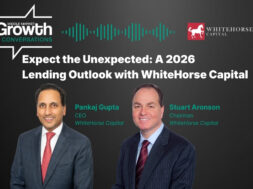Inflation Opens an Opportunity for Mid-Market Companies to Partner with Private Equity
With inflation on the rise, private equity firms have an opportunity to strengthen ties with mid-market businesses in their portfolios and guide them to stability.

With consumer prices rising at their fastest pace in decades, middle-market investors and business leaders are wading through the uncertainty of inflation as they navigate a trove of additional headwinds.
Supply chain disruptions and subsequent shipping rate hikes, consumer goods and raw material cost increases, and rising wages remain top of mind for the middle market. These factors continue to drive inflation, and investors and analysts lack consensus as to what, exactly, lies ahead.
Amid the uncertainty, however, is an opportunity for private equity firms to strengthen their position as strategic partners to middle-market portfolio companies feeling the pressure of high costs and an unpredictable market.
Looking Ahead
Middle-market businesses have plenty to be concerned about as inflation continues at its highest pace since 1982, with the U.S. Bureau of Labor Statistics revealing a 7% increase in consumer prices in 2021.
Businesses across the mid-market are feeling the impact from multiple sides. Growing shipping and logistics costs add a financial burden for many companies. The cost of human capital is on the rise, too, with the current tight labor market displaying the classic correlation to high inflation levels. For middle-market companies, that means slim pickings for talent, and higher labor costs as workers seek more robust compensation.
And now, rising interest rates are quickly entering the conversations of regulators, particularly as COVID-era stimulus efforts wrap up, and as the Biden administration nominates candidates for vacant Federal Reserve posts.
The Senate Banking Committee held confirmation hearings last week for President Biden’s Fed picks, during which inflation emerged as a key area of focus.
“I’ve lived in countries and advised countries in a situation of hyperinflation, so I am motivated by seeing the suffering of workers and businesses just trying to plan their everyday lives in facing an inflationary environment,” stated economist Lisa Cook, one of Biden’s Fed nominees, during questioning.
Cook acknowledged that she would consider raising the federal funds rate as one potential measure to combat inflation.
Indeed, interest rates are already on the rise, with some analysts warning a sharp spike could be on the horizon.
PE Firms as Partners
As middle-market businesses navigate the pressures of inflation and shifts in government monetary policy, they’ll be seeking trusted partners to advise on how to move forward.
Private equity firms may have an opportunity to reinforce their position with mid-market portfolio companies not only as sources of financing, but as strategic partners that can advise business leaders on a sound financial strategy to wade through inflation.
According to the World Economic Forum, small and medium-sized businesses are particularly vulnerable to the effects of rising prices, yet they are essential in a post-pandemic economy.
Private equity, the organization said in a report last month, will play an important role in supporting those businesses.
“Almost by definition, private equity can help with the investment challenge SMEs face today”
World Economic Forum
“Almost by definition, private equity can help with the investment challenge SMEs face today,” the WEF said, noting that private equity can connect business leaders to capital they need to accelerate their digital transformation and invest in environmental, social and governance initiatives.
Beyond funding, the WEF said private equity firms can help middle-market businesses strategically structure their finances, which it described as “a key differentiator as rising inflation increasingly erodes the value of cash sitting idle on balance sheets.”
Of course, private equity firms are not immune to the impact of inflation and subsequent interest rate increases, which will drive up the costs of leveraged buyouts as well as financing to fuel expansion or add-on acquisitions.
Yet the private equity industry expects an active year of dealmaking ahead. Meanwhile, interest in the PE asset class is climbing as suppressed government bond yields and volatile public equities drive some investors to increase their allocation to private markets.
With PE on the radar of more investors, and with the middle market in search of strategic partners to help them through uncertainty, the private equity arena may see a promising path ahead to guide portfolio companies toward resilience—and successful exits.


